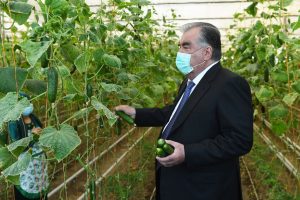Kyrgyzstan’s election-induced semi-revolution has certainly occupied most Central Asian observers this week. But neighboring Tajikistan also has an election approaching, too. Tajikistan’s presidential election is scheduled for October 11.
Tajikistan’s election will be nothing like the parliamentary polls in Kyrgyzstan. Where in Kyrgyzstan there are various nodes of power and an established precedent of street-protest driven revolutions, Tajikistan has but one node of power: Emomali Rahmon.
In an event this week, hosted online by the George Washington University’s Central Asia Program, panelists approached the question of “what’s at stake” in Tajikistan’s election.
Sirojiddin Tolibov, managing editor of RFE/RL’s Tajik Service, recalled 28 years ago in November when he heard over the Soviet loudspeakers at a bus terminal about the appointment, in a special session, of a new head of Tajikistan. “What a strange name, I thought… Emomali Rahmonov. Both ‘imam’ who leads the prayer, and Rahmonov,” which is also an Islamic reference. “Rahman,” meaning gracious in Arabic, is one of the names of God in Islam. (In 2007, Rahmon dropped the Russian-style -ov from his name.)
This time, Tolibov commented, “Chinese loudspeakers will announce Emomali Rahmon as president of Tajikistan for the fifth consecutive time.”
Tolibov, along with fellow panelists Hélène Thibault and Edward Lemon, didn’t question that the election’s result is predictable. In a vox pop with people in Dushanbe, Tolibov said that no one could even name the other four candidates who will appear with Rahmon on the ballot. (For reference, they are: Rustam Latifzoda of the Agrarian Party; Abduhalim Ghafforov of the Socialist Party; Miroj Abdulloev of the Communist Party; and Rustam Rahmatzoda of the Party of Economic Reforms.)
One person, he said, named Rahmon’s son Rustam Emomali, currently second in line for the president as chair of the Senate.
“Overall, for people in Tajikistan the price of potato or meat is much more interesting than the presidential election,” Tolibov explained. Tajikistan’s economic condition, never quite good, is in dire straits amid the coronavirus pandemic. It has both prevented Tajik migrant workers still in Russia and Kazakhstan from sending much money home and also stopped those in Tajikistan who would typically go abroad for seasonal work from going. “People are so desperate,” Tolibov said, “because winter is coming…”
Existential issues are at the forefront of most people’s minds — food, shelter, electricity.
Given that, why bother with an election at all, The Diplomat asked the panelists. Edward Lemon, now a research assistant professor at Texas A&M University’s Bush School of Government and Public Service, pointed to the Tajik Constitution.
“They claim in the first article of their constitution to be a democratic state,” Lemon noted .”And obviously to be a democratic state requires at least holding elections no matter how free and fair those are.” Lemon pointed to a “symbolic element” present. Even if no one believes the election is real, there’s a need on the part of the government to perform the actions of a democracy to continue claiming to be one.
“It’s a symbolic legitimacy that they have to do, even if its a masquerade,” Hélène Thibault, a professor of political science at Nazarbayev University commented.
Tolibov added that Tajikistan is a donor-dependent state. Many of the countries that give aid of various kinds to Dushanbe, largely motivated by their concerns about the Afghan border region, are Western democracies. So, he said, Dushanbe has “to follow the rules.”
How much can a symbolic election matter?
“It’s the aftermath of the election that really matters,” Thibault stressed. “Everyone is wondering when is the succession of power going to take place.”
Rahmon, 68, will secure another seven year term in the upcoming election. But he may not serve out that full term and he doesn’t even have to in order to retain power.
In his 28 years as president, Rahmon has overseen the codification of his own personal myth, tied to the country’s devastating 1992-1997 civil war. In 2015, the Tajik Parliament passed legislation naming him the “Founder of Peace and National Unity, Leader of the Nation” — a title that came with lifelong immunity from prosecution and a role in the government as long as he lives.
“Although Rahmon is officially president, he has all the attributes of a king,” Tolibov commented.
Rahmon is a king with a big, powerful family. He has seven daughters and two sons, the fundamental parts of a massive extended network running into the thousands. Within that network are Tajikistan’s richest and most powerful people. For the time being, Thibault noted, the family has been “cohesive.”
Rahmon, Lemon said, “has been a master of managing and manipulating the elite within the country” and as he looks to the eventual transition of power, “his priorities will be maintaining power within the family, in particular.”
“But there are obviously those within the family who will, potentially, struggle with each other for different economic assets,” Lemon argued, naming Rustam, his sister Ozoda and her husband, Jamoliddin Nuraliev, the Sohibovs and others who have married into the wider Rahmon family network. Rahmon, at the top of the pyramid, holds the rest in place for the most part, Lemon said. But once he begins to depart, it “will be interesting to see whether struggles emerge between those individuals and interest groups.”
“The threat to Rahmon’s rule comes not from outside,” Tolibov said. “The threat to Rahmon comes from his own circle.”

































